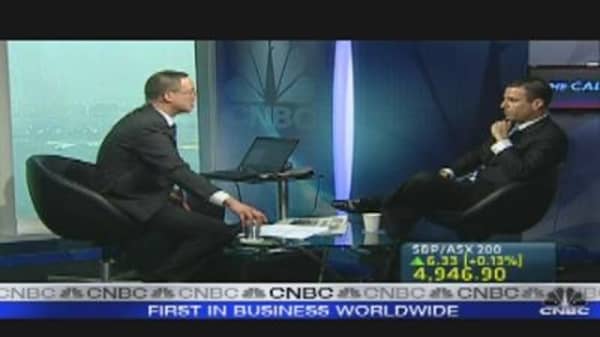China will release its closely-watched inflation data this Friday. According to a Thomson Reuters poll, consumer price index (CPI) for March is expected to tick higher to 5.2 percent from a year earlier, compared to 4.9 percent in February, year-on-year.
However, one China market expert thinks the CPI is likely to surprise on the downside.
"I know a lot of people are calling for 5.5 percent. I think we could be in somewhere between 4.8 and 5 percent," Aaron Boesky, Chief Executive Officer and Director of Marco Polo Pure Asset Management told CNBC this week.
Boesky said authorities have been "vigilant" about rising prices, and believes China is reaching the top of its tightening cycle.
Last Tuesday, China's central bank raised rates for the fourth time since October, hiking the benchmark lending rates by 25 basis points to 3.25 percent for one-year local currency deposits and to 6.31 percent for one-year loans.
Despite data over the weekend showing the country posting its first quarterly trade deficit in seven years, reflecting the rising prices of imported commodities, Boesky believes the upward inflation trend is starting to turn.
"I think CPI is drifting down and I think we are going to see the end of the rate hike cycle for the time being," Boesky said. "The bigger picture points to a winning battle against inflation by the Chinese government."
Not all experts agree. Leif Eskesen an economist at HSBC, believes inflation remains a "primary objective" for China.
He forecasts another 25 basis-point rate hike in the next couple of months and expects reserve requirement ratio (RRR) for commercial banks to be raised by 100 basis points in the same period.
China has raised its RRR 9 times since 2010.
"What we're seeing now is more demand-led pressures building up because capacity is tight, and that is bringing up core inflation," Leif said, adding that growth in Asia to "hold up quite well", which will in turn keep capacity constraints tight.
Uwe Parpart, Chief economist & Strategist of Asia at Cantor Fitzgerald, concurs with the view. He expects China's tightening policy to continue to the end of August, but says it's unlikely to hamper China's growth.
"I don't think the tightening is going to make a huge amount of difference," he said, maintaining his growth forecast for China's economy at between 9 and 10 percent for 2011.
Risk Trade to Return
Boesky expects the end of the tightening cycle to coincide with a return of investors' appetite for risk trade by mid-year, particularly for China's A-shares due to their attractive valuations.
"The 2011 Shanghai A-share market PE [price-to-earnings] is estimated at about 11.2 right now. That would mark the lowest PE multiple on a full year basis that we've ever seen in the history of the Shanghai stock market," he said. Click here for full interview.
The market will also be buoyed by a pullback in real estate prices, Boesky added.
"Chinese investors have spent the last 3 years piling into the real estate game. And real estate does seem to be topping out here. We've seen a pull back in real estate prices across the 35 major cities at around 9, 10 percent in price. This seems like a good time for Chinese investors to drift back to the equity market."



